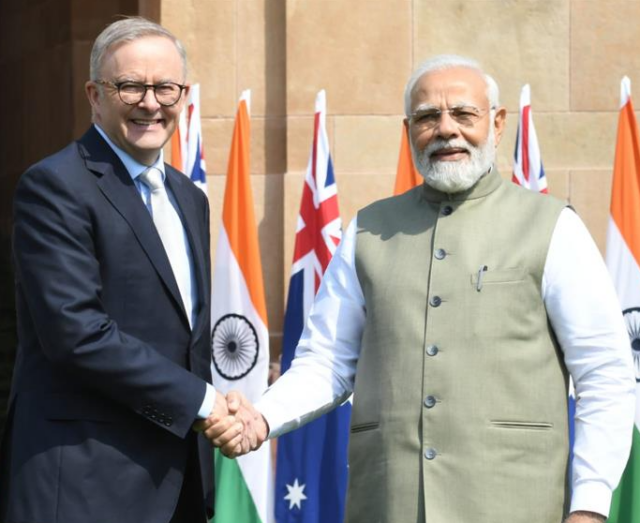Outgoing Australian High Commissioner Barry O’ Farrell is extremely upbeat about bilateral ties with India.
‘Thank you Minister @DrSJaishankar and Foreign Secretary @AmbVMKwatra for your continued support & patience during my tenure. What we have achieved in ties during my time here will be dwarfed by what is to come & be achieved.’
At an interaction organised by the Indian Association of Foreign Affairs Correspondents at the India International Centre in Delhi, he said the Economic Cooperation and Trade Agreement (ECTA), and a common vision of the Quad and the Indo-Pacific, and plans to build resilient supply chains had brought the two countries closer together.
The pandemic had taught both nations the importance of secure supply chains, and Australia had minerals, rare earths and other natural resources that India needed to grow, and “India can get these from a close neighbour, or from a trusted partner (like Australia),” he said, in an obvious reference to China.
Asserting that bilateral ties were the “best ever” levels, Farrell lauded the Indian community in Australia, estimated at over 700,000, saying they had played an important role in strengthening ties. This excludes the over 86,000 Indian students enrolled in Australian universities. Given the size of the Indian community there, he said Australia could never ignore Indians, and welcomed people from all parts of India.
He said his government was taken by surprise over the violence and vandalism in Australia following calls for a “referendum” by pro-Khalistan elements and the attacks on Indian community centres and temples earlier this year. Asserting that his country was proud about being a multicultural society, he said the people behind the attacks were “blackening the name of Australia” and “It is disturbing for me to see because the diaspora has been seen as a very law abiding and peaceful community.”
Days after Prime Minister Modi’s visit, during which he had publicly raised the issue, the Sydney Masonic Centre cited security risks and threats to the community to cancel a Khalistan referendum event planned for May 28 by ‘Sikhs for Justice,’ a separatist group.
Asked about media reports in Australia slamming Prime Minister Albanese for not raising the alleged decline in democratic freedoms in India during Modi’s visit, O’Farrell said that although “no democracy is perfect,” Australia always stood by its values. Referring to the ruling BJP losing in the recent Karnataka Assembly elections, he said “that is a sign of democracy,” and it proved that democratic processes in India remain robust.
Quizzed about Australian universities banning students from six Indian states due to forged or fake applications, he clarified that owing to “an uptick of false information and fraudulent applications, a very small number of universities have turned the tap off on migration agents responsible,” and urged Indian students to be wary about agents that file false information in their application forms, and insist on personally cross-checking the applications and the visa forms before they are filed.
Media reports suggest that Australia’s ambassador to Germany Phillip Green is likely to succeed Farrell in Delhi.
RELATED ARTICLES:
https://bharatshakti.in/australia-cosies-up-to-india-to-balance-china-but-is-the-relationship-overrated/
















